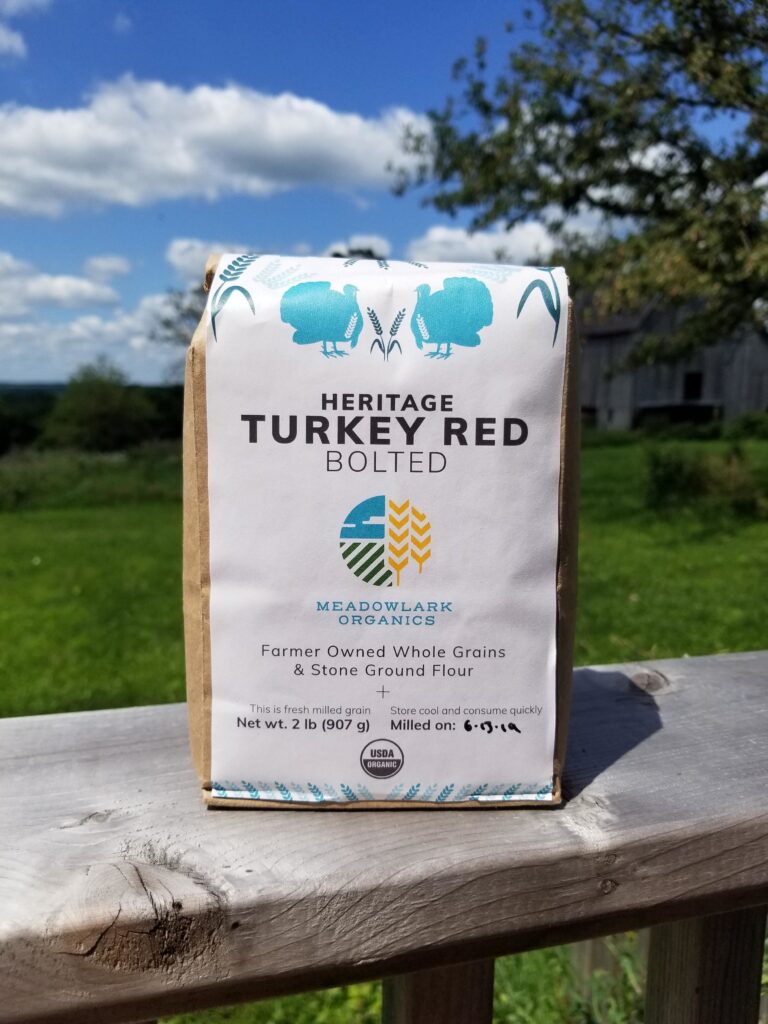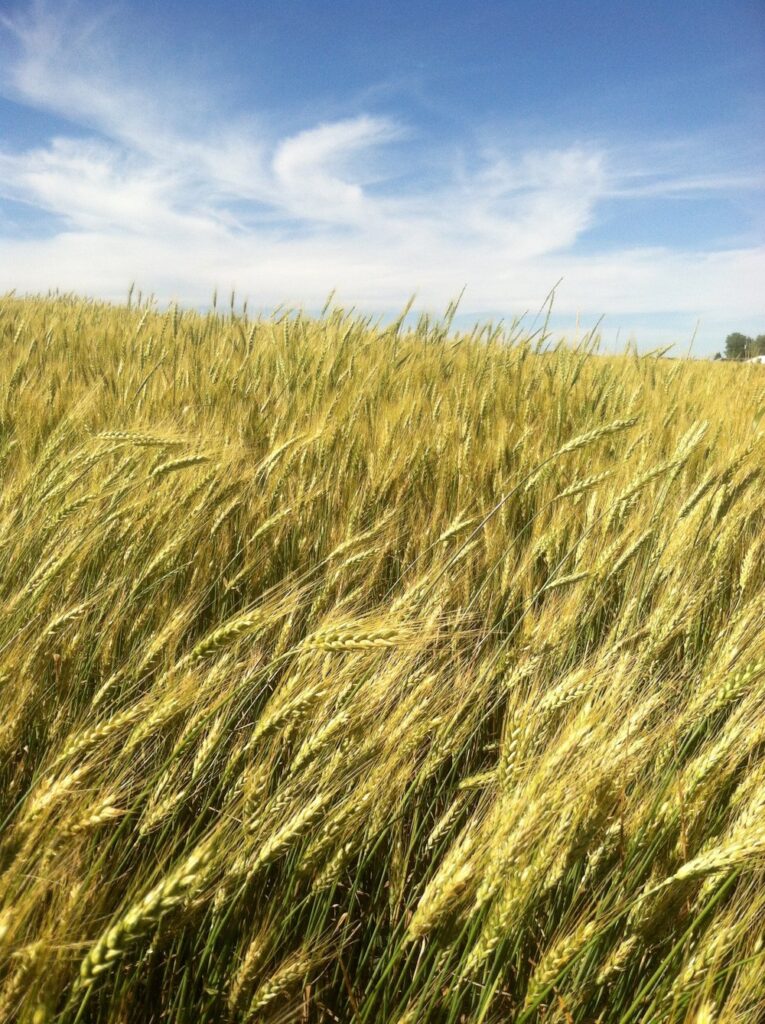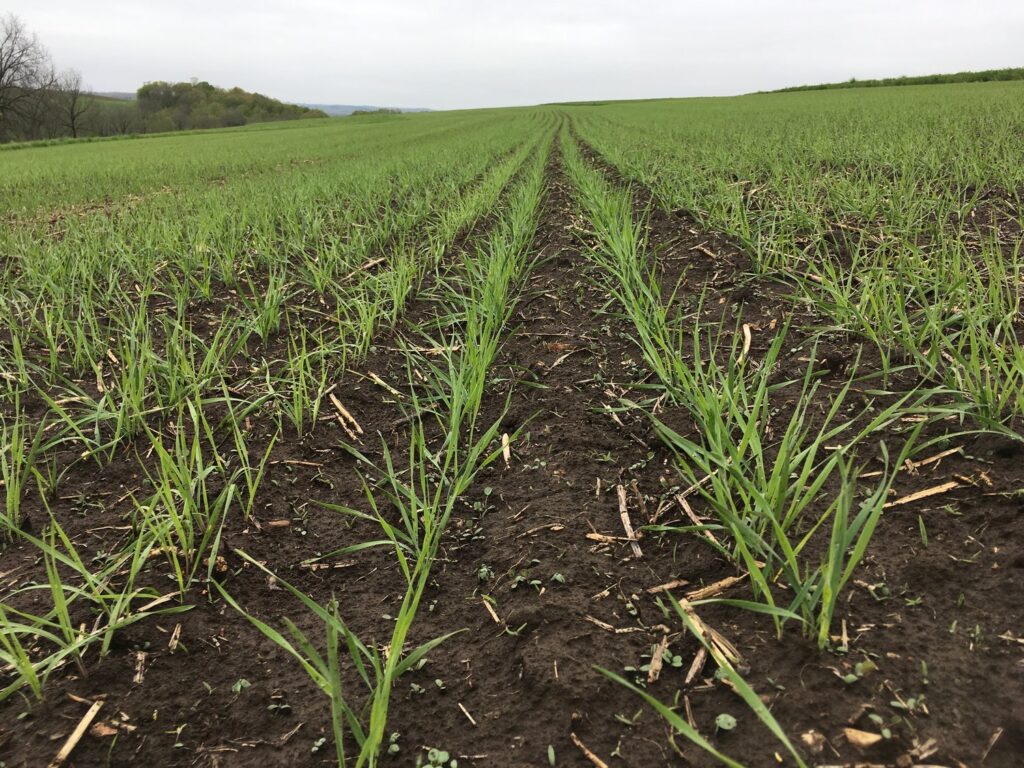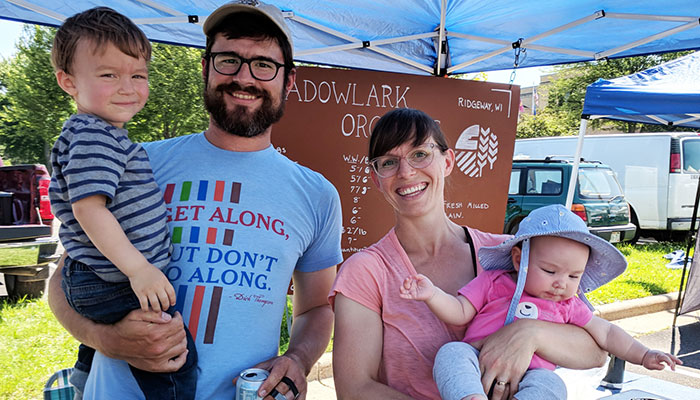As organic farmers, millers and grain enthusiasts, John and Halee Wepking are definitely entrepreneurs. However, turning a profit is hardly their main motivator. In co-founding Meadowlark Organics in 2015 and Meadowlark Community Mill in 2021, they’ve built an entire supply chain from the farm up, creating ample opportunities in Wisconsin’s Driftless Region.
“We’re doing this in an entrepreneurial way, but mostly because we see the market as a good way to leverage revolutionary change—economically, socially and environmentally,” John says. “There is no quicker way to do that than to create markets for the crops you want to grow. Profit is not the end goal in what we’re trying to accomplish. It’s simply a lever to create more change.”
Getting Started
After working in restaurants in New York, John and Halee moved back to Wisconsin to start farming their favorite small grains. Though they’d initially hoped to take over John’s family’s farm, they found a better deal: partnering with Paul Bickford, a longtime grass-fed dairy and organic grain producer looking to pass on his knowledge and eventually his land to a younger couple.
Although wheat production is uncommon in Wisconsin, these varieties are well-suited to succeed in the state’s hilly southwestern corner.
In 2015 and 2016, the three transitioned Paul’s operation to include growing food grade grains such as hard wheat, rye, and spelt, establishing Meadowlark Organics. Meanwhile, the Wepkings secured Farms Services Agency (FSA) financing to purchase 80 acres of their own, plus 22 breeding heifers and a yearling bull.
Although wheat production is uncommon in Wisconsin, these varieties are well-suited to succeed in the state’s hilly southwestern corner. Plus, they can be stoneground into flour that Plus, they can be stoneground into flour that John and Halee knew local chefs, bakers and consumers would love.


Moving Milling On-Farm
At first, Meadowlark Organics sold its grain to nearby Lonesome Stone Milling. “Then we got a USDA value-added producer grant that allowed us to pivot to contracting the mill to process our flour, which we direct-marketed,” John explains.
But before long, Lonesome Stone’s owner was eyeing retirement, prompting the Wepkings to explore buying the mill and moving it onto their farm. They felt Meadowlark Organics could be more sustainable, cost efficient and profitable that way. But to make it happen, they needed financing, which meant selling lenders on their idea.
To their advantage, Meadowlark Organics had already proven its concept through its toll-milling relationship and had loyal customers on board. John and Halee also began working with FFI, participating in the Raising Equity course in 2019 and the FFI Live Coaching Cohort in 2020.
John says both sessions provided great foundational knowledge and opportunities to network with other farms and food brands with similar values. “But the one-on-one assistance with launching and financing the flour mill was what really helped us turn the corner,” he says. “Tera helped us a lot when we were working on our business plan pro forma to make sure it was ready for lenders. She was very hands-on.”
With FFI’s guidance, Meadowlark Organics secured two key loans in 2020. They got a $475,000 capital loan, which let them purchase Lonesome Stone’s mill and equipment, construct a new building and milling infrastructure on the farm, and buy additional equipment. Then with a $150,000 operating loan, they could buy grain seasonally and carry inventory. And during the loan underwriting process, Meadowlark hired Rink DaVee, to manage mill production in the last months of milling in Lone Rock, and oversaw the creation of new production systems and recordkeeping at the new on-farm mill in Ridgeway.
The New Business
With the mill moved on-farm and infrastructure built, John and Halee launched Meadowlark Community Mill in 2021. “We’ve built a mill that is farmer owned, and we take grain from field to bins, clean it, mill it and almost entirely self-distribute it right now,” John says. They’ve since added two more full-time employees at the mill and one farm worker.

While their own farm produces most of the grains for the mill, Meadowlark also buys small grains from other local growers. This enables their neighbors to diversify their crops away from corn, soybeans and other dominant rotations that are hard on the soil—and earn decent money for their efforts.
“Typically, farmers make pennies on the dollar compared to the eventual retail food dollar because they’re supplying a commodity raw ingredient,” John explains. “The farmer can’t set the price based on the cost of production. They have to take whatever is offered to them, so it’s not necessarily profitable.”
Meadowlark sells into bigger markets like Madison, Milwaukee and Minneapolis-St. Paul. But it remains committed to supplying grocery stores, restaurants and bakeries in the often-overlooked small and midsize cities of the region, such as Viroqua.
Success Benchmarks
As for how Meadowlark gauges success, John says they are still figuring that out. However, “one of the main things FFI prepared us for is we’re acutely aware of the shortcomings of our data and know how to make it better,” he explains. “We may not have certain data on hand, but we know how important it is to collect and do regular analysis on.”
Numbers aside, John and Halee know they’ve started something that’s immensely valuable to their community. “Our grain business is much larger than just value-adding the grains we grow,” John says. “We are trying to create markets for our neighbors as well. This has economic profitability benefits, but also helps with financial, ecological and soil health sustainability. We are creating jobs here and keeping the food we grow here.”
Meadowlark Organics continues to innovate, growing various heirloom varieties and doing unique interplanting such as popcorn as a living trellis for vining dry bean varieties. “For now, we’re a for-profit business, and if we’re profitable, that allows us to continue doing this and reinvest and grow,” John says. “But down the road we’ll be, at the very least, employee owned but hopefully a co-op or nonprofit.”
He and Halee appreciate FFI’s support in getting this far. “We are grateful that FFI exists and that we’ve been able to take advantage of it,” John says. “For a long time, this type of technical assistance was not available—and certainly not for free—so I encourage others to reach out for it.”

